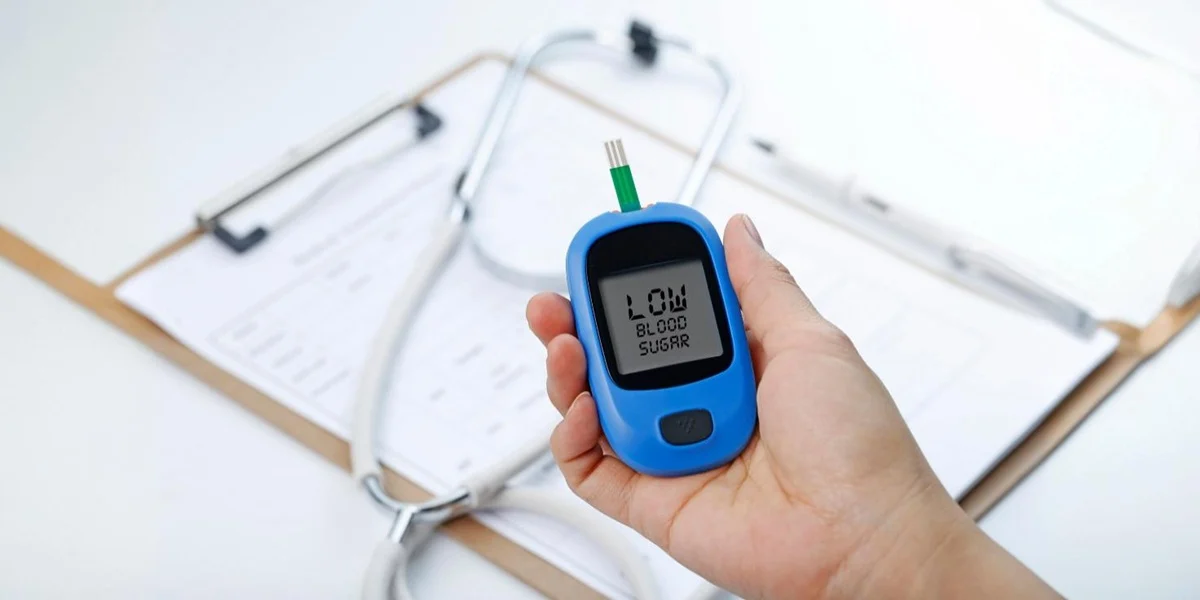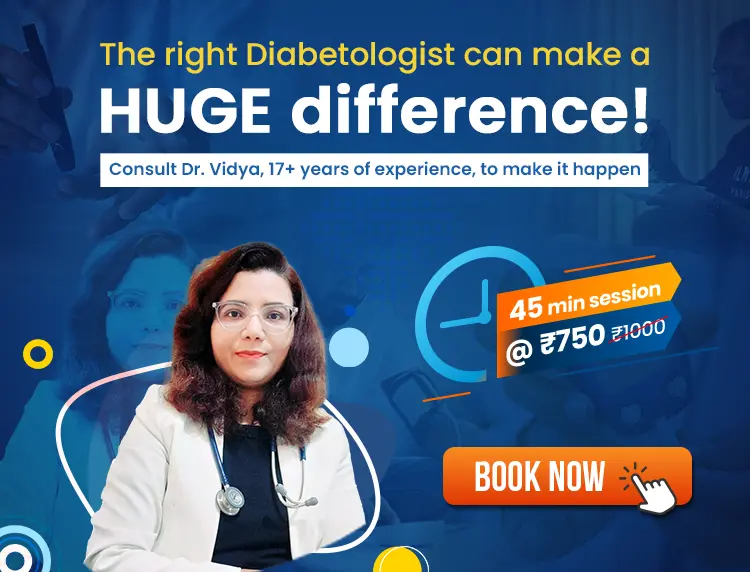What are the Symptoms of Low Blood Sugar?

A regular day for you. You’re in the middle of something – maybe working, walking, or just going about your day – when suddenly, you feel a little dizzy, shaky, or sweaty for no reason. You grab a snack, and within minutes, you feel better. Have you experienced something like this?
Well, that could be low blood sugar, or as called by medical professionals, hypoglycemia, which happens when your body runs low on fuel or energy. While it’s more common in people with Type 1 & Type 2 Diabetes or those on oral medications and insulin, the fact is that absolutely anyone can experience it.
So, how low is too low?
- 70 – 55 mg/dL → Mild to moderate symptoms ⚠️
- Below 55 mg/dL → Severe symptoms 🚨
- Below 40 mg/dL → Critical! Needs urgent attention ❗
Now that we are clear with the basic numbers, let’s understand what are the signs your body gives you when your sugar levels drop!
Diabetes Reversal
Calculator
To know your chances of Diabetes reversal, take the Diabetes Reversal Test
| What exactly are ‘Symptoms’? 🤔
Symptoms are your body’s way of telling you that something is going wrong in your body and you need to take care of yourself! 👉 Example:
|
What are the Symptoms of Low Blood Sugar?
The symptoms of low blood sugar can vary from person to person, depending on how long they have had diabetes and how low their blood sugar drops.
Typically symptoms can be seen in two ways:
One is through your Body’s Response:
- Feeling anxious or nervous
- Shaking or trembling
- Fast heartbeat
- Sweating a lot
- Feeling very hungry
Another way is through your Brain’s Response:
- Trouble focusing
- Headache
- Blurry vision
- Feeling dizzy or lightheaded
- Feeling confused
- Trouble speaking/slurring speech
- Feeling restless or irritated
- Seizures/fits
- Fainting or passing out
Now before we move into more details, just a quick info for you, if you or someone in your family has been experiencing these symptoms, then they can have a 1-on-1 online consultation with our in-house diabetologist Dr. Vidya Walinjkar. She will do a detailed analysis and breakdown the situation for you and guide you on what to do.
What is Hypoglycemia Unawareness?
Hypoglycemia unawareness happens when a person does not feel the initial usual warning symptoms of low blood sugar, like shaking, sweating, or hunger. So, you need to be more aware of this condition because you may not realize your blood sugar is dropping.
Why Does It Happen?
- Frequent Low Blood Sugar Episodes: If blood sugar drops too often, the brain gets used to it and stops responding with symptoms.
- Tight Blood Sugar Control: Keeping blood sugar too low for long periods can reduce the body’s ability to detect drops.
- Nerve Damage (Neuropathy): Long-term diabetes can damage the nerves that detect low blood sugar.
Who Is at Risk?
- People with long-term diabetes (especially Type 1)
- Those who experience frequent low blood sugar episodes
- People with nerve damage (autonomic neuropathy)
- People using insulin or strict diabetes management plans
Why Is It serious?
Without warning, symptoms, such as blood sugar, can drop too low without the person realizing it. This can lead to serious complications if not treated quickly.
When to Seek Medical Help for Low Blood Sugar?
Most mild cases of low blood sugar can be treated by eating or drinking something sugary (following the rule of 15). However, in some situations, medical help is needed immediately.
Immediate Medical Attention Requires When
- Blood sugar stays low (below 70 mg/dL) despite treating hypoglycemia
- Severe confusion, slurred speech, or trouble moving – If they seem very disoriented and can’t help themselves.
- The person faints or is unresponsive
- They have a seizure (convulsions)
- Sugar or glucagon doesn’t work.
You Should See a Doctor Frequently If
✅ Low blood sugar happens frequently – Repeated episodes can lead to hypoglycemia unawareness, making future lows more dangerous.
✅ You don’t know why it’s happening – If it keeps happening despite eating well and taking medicine properly, a doctor can help adjust treatment.
✅ Symptoms are getting worse or changing – If you’re experiencing new or stronger low blood sugar symptoms.
How to Recognize Low Blood Sugar?
Your doctor diagnoses low blood sugar by reviewing symptoms, blood sugar levels, and your medical history. Your doctor may ask:
- How often do you feel shaky, weak, confused, or sweaty?
- Do symptoms improve after eating sugar?
- Does low blood sugar happen after meals or when fasting?
Checking Blood Sugar Levels
- Blood Sugar Test (Finger Prick Test) – A blood glucose meter checks if your sugar is below 70 mg/dL when symptoms of low blood sugar appear.
- Continuous Glucose Monitor (CGM) – Tracks sugar levels throughout the day and alerts you to drops (up to 14 days). If you get an alert, cross-check with a glucometer reading. If the CGM shows a red mark, it triggers an alert to recheck your sugar levels for accuracy.
Additional Tests
If low blood sugar happens frequently, your doctor may recommend further tests to determine the cause:
- Fasting Blood Sugar Test – Measures your sugar levels after fasting for several hours.
- Mixed Meal Tolerance Test (MMTT) – Checks sugar levels after eating to see if your body is making too much insulin.
Other tests may include:
- Insulin and C-Peptide Tests – To check if the body is producing too much insulin.
- Liver, Kidney, and Hormone Tests – To rule out other diseases affecting blood sugar levels.
What to Do in Severe Hypoglycemia?
If blood sugar drops below 54 mg/dL or the person cannot eat, seek emergency medical help immediately, call your doctor or call a hospital’s emergency helpline number.
Even after giving glucagon, contact a doctor or emergency services right away to prevent complications. Don’t wait for symptoms to get better on their own.
How to Prevent Low Blood Sugar?
Preventing low blood sugar requires awareness, good habits, and proper management. Here’s how you can stay ahead:
1. Educate Yourself
Recognise early signs of low blood sugar (like shakiness, dizziness, confusion, sweating).
- Avoid triggers like missed meals, intense workouts, or alcohol.
- Carry glucose tablets or carb-rich snacks for emergencies.
2. Eat Smart
Balance carbohydrates to manage blood sugar.
- Consult with your doctor, dietician or a nutritionist to create a meal plan.
- Keep glucose or carb-rich snacks handy.
- Consider a bedtime snack to prevent nighttime lows, especially for type 1 diabetes.
3. Exercise Carefully
Monitor blood sugar before and after exercise.
- Have a small meal or snack before working out.
- Carry fast-acting carbs during physical activity.
- Adjust insulin doses based on exercise intensity.
4. Glucose Monitoring
Regularly check your blood sugar levels.
- Test before meals, after meals, and before sleep.
- Use a Continuous Glucose Monitor (CGM) for real-time tracking.
5. Manage Medications
Consult your doctor for proper medication adjustments.
- Never adjust insulin or dosage without medical advice.
- Evaluate alternative insulin options that reduce hypoglycemia risk.
How We At Fitterfly Can Help You?
We understand the challenges of managing blood sugar levels, especially hypoglycemia. You can effectively manage low blood sugar episodes by recognizing the symptoms, taking preventive measures, and following the Rule of 15. It’s essential to manage your diabetes well to maintain normal blood sugar levels (70 mg/dL – 126 mg/dL).
At Fitterfly, we believe that if you manage your diabetes well, which is the root cause, complications like hypoglycemia can be managed effectively. We help our members achieve this through comprehensive and personalized support.
Our Diabetes Prime Program provides you with personalized support tailored to your needs. Our expert nutrition coaches create customized meal plans to stabilize your blood sugar levels. With continuous glucose monitoring (CGM), you get real-time insights to catch drops early.
Our physiotherapy coaches guide you in safe exercise routines to prevent hypoglycemia during physical activity. Plus, our success coaches provide support and education to help you stay informed and confident in managing your condition.
For more information, you can talk to one of our program advisors by just giving a missed call at 08068507599.
REVERSED Diabetes in 3 months


Happy members
EMI
Guarantee
4.8/5
Diabetes Prime Program
This blog provides general information for educational and informational purposes only and shouldn't be seen as professional advice.
Frequently Asked Questions
Why is Hypoglycemia Dangerous?
Hypoglycemia, or low blood sugar, can be problematic if not treated. Prolonged low blood sugar can cause serious issues like seizures, memory problems, or loss of consciousness. In extreme cases, it can be life-threatening.
How Does Hypoglycemia Happen?
Hypoglycemia occurs when blood sugar drops below normal levels, usually below 70 mg/dL. If it falls below 54 mg/dL, it becomes severe and needs immediate attention to prevent complications.
How is Hypoglycemia Diagnosed?
Hypoglycemia is diagnosed by looking at symptoms and testing blood sugar levels. As mentioned in the blog, your doctor may ask for a few tests. Also, you can use a glucometer to check sugar levels. If it happens in someone without diabetes, further testing is needed to find out why it’s happening.
What Triggers Hypoglycemia?
Several things can trigger hypoglycemia, such as not eating enough, skipping meals, or exercising more than usual without eating. It can also happen if someone changes their medication without a doctor’s guidance. Drinking alcohol, especially on an empty stomach, can also affect blood sugar levels and cause hypoglycemia.
Can Hypoglycemia Cause Death?
If left untreated for too long, hypoglycemia can be life-threatening. Extremely low blood sugar can lead to a coma and, in rare cases, death. Recognizing the signs and managing blood sugar quickly can help prevent this.
What Blood Sugar Level is Considered Hypoglycemia?
Hypoglycemia is usually when blood sugar drops below 70 mg/dL. If it goes below 54 mg/dL, it’s considered severe and needs immediate treatment to avoid serious consequences.
What is Reactive Hypoglycemia?
Reactive hypoglycemia happens after eating when the body releases too much insulin, causing blood sugar to drop suddenly. This can cause symptoms like dizziness, shakiness, and fatigue within a few hours after a meal.
What is Fasting Hypoglycemia?
Fasting hypoglycemia happens when you go too long without eating, like overnight or after prolonged exercise. It can also happen in people with certain health conditions. Symptoms include weakness, confusion, and irritability.
What is Drug-Induced Hypoglycemia?
Some medications, especially insulin or certain diabetes medicines, can cause hypoglycemia if they lower blood sugar too much. This is more common in people with diabetes, and careful monitoring of medications is needed to avoid it.
How Does Alcohol-Induced Hypoglycemia Occur?
Alcohol, especially when consumed on an empty stomach, can interfere with the liver’s ability to release sugar into the bloodstream, leading to extremely low blood sugar. This is more likely in people who drink a lot or have other health conditions.
Can Medical Conditions Cause Hypoglycemia?
Yes, some medical conditions like liver disease, kidney disease, hormonal issues, and rare conditions like insulinoma (a tumor that makes too much insulin) can cause hypoglycemia. Managing these conditions is key to controlling blood sugar.























